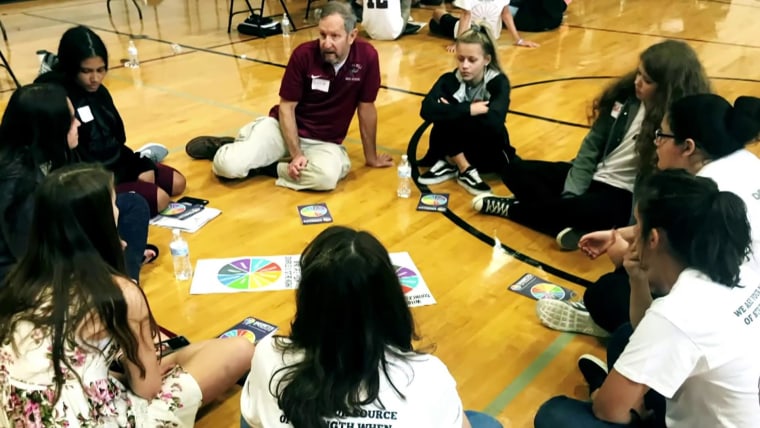Before the coronavirus pandemic, I had one or two college students each semester who missed some classes due to anxiety or depression. Since Covid-19 hit, I have witnessed an epidemic of anxiety and depression in the form of missed online classes, failure to complete assignments and struggles to focus.
Schools at all levels can be a critical part of the solution by helping to address their students’ mental health challenges in less conventional ways.
This experience is familiar to many parents and educators, but here’s what many may not know: The residue from our children’s mental health struggles may continue even after things feel more “normal.” British researchers recently calculated that, based on historical evidence, “Children and adolescents are probably more likely to experience high rates of depression and most likely anxiety during and after enforced isolation ends.” For how long? Up to nine years.
Many parents don’t have the resources for private therapy and neither do most schools. Clearly, though, these emotional needs — which will surely interfere with many children’s ability to attend school and to meet the same high-pressured academic standards as before — won’t disappear.
The good news is that schools at all levels can be a critical part of the solution by helping to address their students’ mental health challenges in less conventional ways.
Some schools are already on the right path, having begun to experiment with yoga, mindfulness and meditation. Most often, these techniques have been lauded for reducing stress and emotional reactivity, especially in students living in difficult circumstances. But a 2019 study conducted by international researchers found that these approaches could also diminish the symptoms of depression and anxiety, as well.
I myself have tried to introduce some of these techniques in my writing and culture classes this past year. I now begin every session with a simple guided breathing exercise which, students have told me, helps them feel calmer, more focused, more present and even safer. The benefit can extend beyond class time, with one person telling me she’s started to use the practice when she wakes up feeling anxious.
I also have students read articles that get them to explore topics about pursuing a more self-aware, meaningful life for which, I’m discovering, they’re starved. Some articles explore how emotions perceived as negative (think: shame, sadness, frustration, fear) can benefit our well being — and can help develop greater emotional resilience — relieving some negative mental states. Who doesn’t need this today? We also examine suffering, and how it’s possible to find meaning and purpose in it, as Viktor Frankl wrote about in his seminal book “Man’s Search for Meaning.”
There’s another powerful way to help children’s mental health that starts with a geometric shape: the circle. While researching my book, I observed groups of boys and men sit facing each other as they openly processed and shared their deeper emotional lives, especially the so-called negative emotions.
In all of these groups — from middle schools to prisons — the boys and men experienced improved mental health in my experience to varying qualitative degrees. A small but growing body of research speaks to the effectiveness of these groups, which are finding success in minimizing anxiety and depression.
Mental health professionals believe that the simple but courageous act of digging deep and sharing our struggles decreases the fear-based power around the emotions that sometimes gird our anxiety and depression, easing their grip.
Just as vital, boys and men who participated discover something that many people wrestling with anxiety and depression in isolation don’t realize: They aren’t suffering alone. Commiseration and the shared coping strategies that blossom from these honest conversations often have profound impact.
One student struggling with suicidal thoughts, for instance, told me that the group conversation helped with “pulling these awful feelings out of me.” A seventh-grader said after boys’ group meetings: “I feel less alone. More understood. This actually helps me focus better in my classes the rest of the day.”
There were also recurrent peer suggestions for anxiety and depression I heard while observing these circle meetings. Remember that your negative thoughts are only thoughts — not reality — and they will go away. Try to get more exercise or do breathing or meditation if these overpowering feelings arise. Call or text someone in the group for support or do a feelings dump in a journal.
Schools can implement these face-to-face support groups in ways that best meet their and their students’ needs to the benefit of everyone, regardless of gender. It’s true that, even if such groups are voluntary, some students might betray another’s confidence or use the vulnerability inherent in such sessions against them. A possible remedy would be employing online discussion board platforms such as Backchannel Chat so students can post anonymously while teachers or counselors moderate the discussions.
School counselors would need to help design and train faculty with both the face-to-face circles as well as online discussion boards. But this doesn’t have to be a complex undertaking, and students and faculty don’t have to plumb depths in which neither feel comfortable.
Of course, these circles are not an alternative to professional mental healthcare. They are a support system that can potentially take the edge off students’ anxiety and depression during the school day. They are also an opportunity for students who could benefit from professional mental healthcare to appear on the radar screens of adults around them.
Simply creating a space where students — and teachers and coaches — surface feelings and experiences in this unprecedented and alienating time would be far more help than many children will otherwise receive. Talk about a teachable moment.
Source: | This article originally belongs to Nbcnews.com











